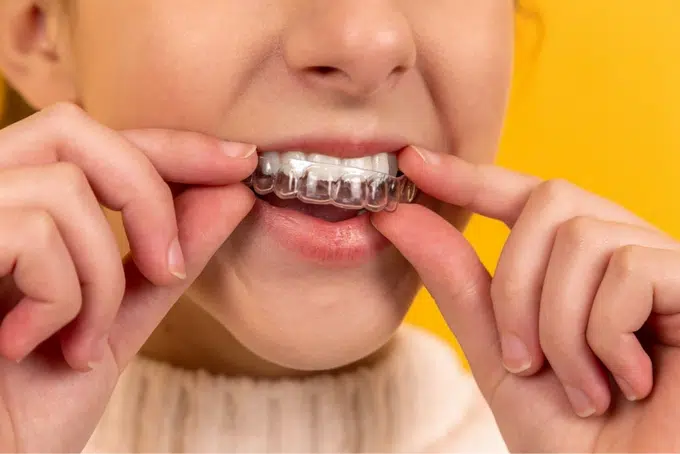Dentists commonly recommend occlusal splints, also known as night guards. They use them to treat patients who suffer from bruxism, a sleep disorder characterised by teeth grinding. Many people clench their teeth together at one time or another. However, frequent grinding can lead to damaged teeth, problems with the jaw, and other oral health issues.
Most people are not aware that they grind their teeth because it is often done subconsciously and while sleeping. You may only find out that you have bruxism after someone tells you that they saw or heard you grinding your teeth. If you are a nighttime grinder, it is vital to seek treatment to prevent dental problems.
In this article, we explain what bruxism is and how to treat it.
What is Teeth Grinding (Bruxism)?
Bruxism is a type of sleep-related movement disorder in which a person repeatedly clenches, bites, or grinds their teeth together. It can be common for people to grind or clench their teeth while awake (awake bruxism). On the same hand, involuntary chewing movements can go unnoticed if it occurs during the night (sleep bruxism).
Under normal circumstances, teeth grinding is harmless. When the habit is frequent, over time, it can cause damage to the teeth. Sleep bruxism is often more severe than awake bruxism. While in a deep sleep, you can unintentionally exert 250 pounds of force on your teeth. This extreme force can wear down your teeth and cause all sorts of other problems, including:
- Permanently damaged teeth (worn down or fractured)
- Fractured porcelain dental crowns or veneers
- Temporomandibular joint (TMJ) jaw problems
- Chronic headaches and neck pain
If you suspect that you grind your teeth, it could affect your dental health. A dentist can assess your mouth during an exam and prescribe a treatment plan.
Related: Check-Up & Clean – Preventative Dentistry
What to Do to Stop Teeth Grinding
It is perfectly normal to have some teeth grinding movement during sleep. This movement is called rhythmic masticatory muscle activities (RMMA), and 60% of people occasionally chew in their sleep. If you have sleep bruxism, you will grind your teeth a lot more from a few times to 100 times per night. The frequency will vary, as patients do not always grind their teeth every night.
There are many causes of bruxism. Stress, anxiety, tension, anger, frustration, and other emotional reactions can act as triggers to nighttime teeth clenching or grinding. In addition, the consumption of cigarettes, alcohol, caffeine, and other factors have been associated with bruxism. Also, patients with gastroesophageal reflux disease (GERD) or obstructive sleep apnea are at risk of more extensive damage from teeth grinding. As most people are unaware of their bruxism, it may surprise them to learn it may cause unexplained tooth pain.
There is no cure for bruxism. If you suffer from emotional triggers, it makes sense to address those issues by finding ways to cope or seeking professional help. Those who suffer from awake bruxism can also consciously try to avoid grinding their teeth. If you have sleep bruxism, obviously that method of treatment will not work. Patients may be treated with surgery, prescription drugs, Botox injections, or mouthpieces.
Related: Why You May be Experiencing Tooth Pain & How to Prevent It
What Are Occlusal Splints and Why Would a Dentist Recommend One?
When treating bruxism, your dentist will develop a plan to manage your teeth grinding. Treatment may include restoring damaged teeth, pain relief, and methods to prevent further damage to your teeth. Occlusal splints for bruxism (also called night guards) are dental teeth guards made especially for patients who grind their teeth.
Although sleep bruxism is difficult to identify, research shows a great need for treatment. The condition can pose a risk to the dental health of all ages. Based on estimates provided by the Sleep Foundation, the prevalence of teeth grinding occurs at the following rates:
- 6-50% of children
- 15% of adolescents
- 8% of middle-aged adults
- 3% of older adults
Dentists recommend occlusal splint therapy because it offers an effective and safe approach to preventing teeth from grinding. Although medications may be helpful even for severe cases of bruxism, they often have side effects when used long term. Surgical options are invasive and come with the risk of complications.
Occlusal splints are devices similar to athletic mouthguards and teeth-straightening retainers. Splints are custom-fitted to match the shape of your teeth. These specialised night guards are available in different types designed to separate teeth, limit jaw movement, and relax the muscles. In some cases, patients with awake bruxism benefit from dental splints as well.
Related: 5 Reasons Why Not To Neglect Your Oral Health
Summary
Teeth grinding is a common condition that is often tricky to diagnose. You may not realise you have bruxism until someone tells you, or you cannot figure out why your teeth or jaw hurt. Although grinding your teeth may not seem all that serious, it can lead to dental issues and pain if left untreated. There is no treatment to cure bruxism completely, but a nightguard will help prevent further damage to your teeth and reduce symptoms.
Have you considered a night guard for your teeth grinding? If not, we offer custom-fitted occlusal splints designed to protect your teeth while you sleep. At Beaches Dental Mona Vale, our professional staff has cared for patients’ dental needs for over 30 years. We treat children and adults in a relaxing environment, ensuring all visits are as comfortable as possible.
Contact Beaches Dental for your Occlusal Splint needs today by calling us at (02) 9997 8822!

